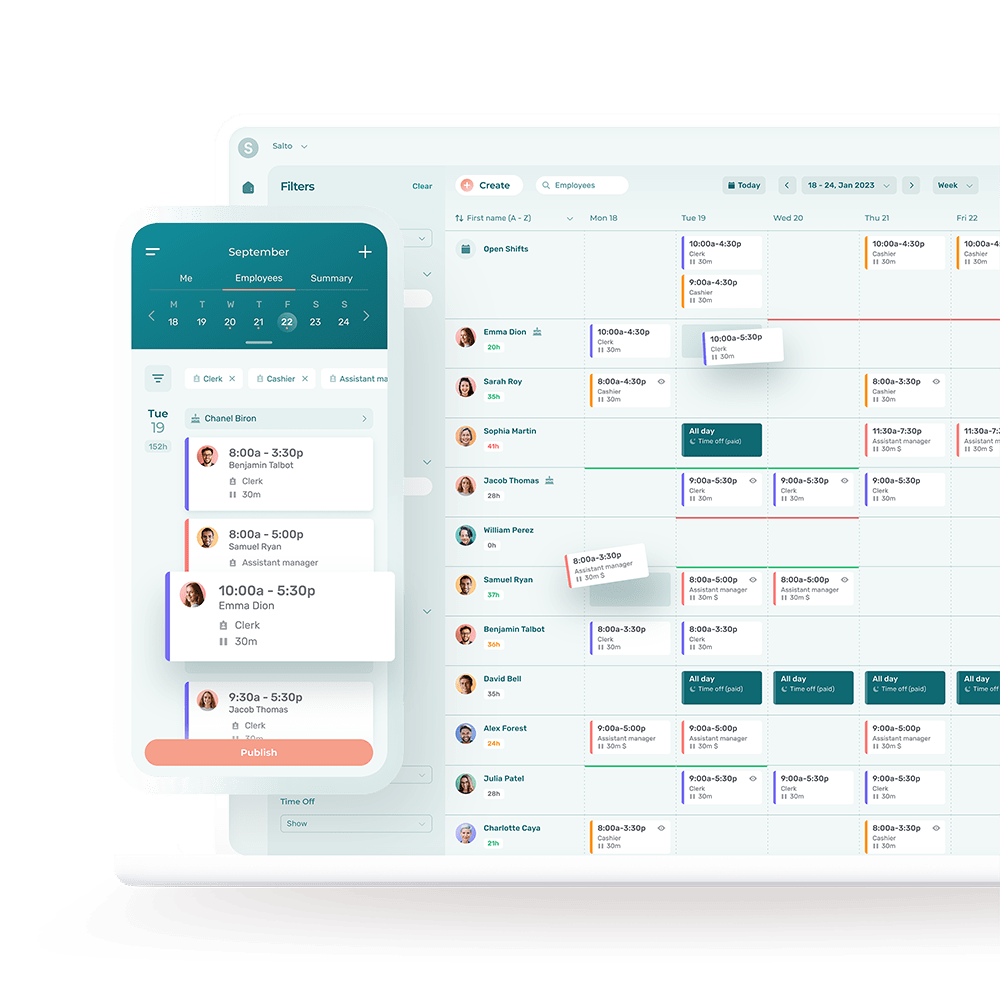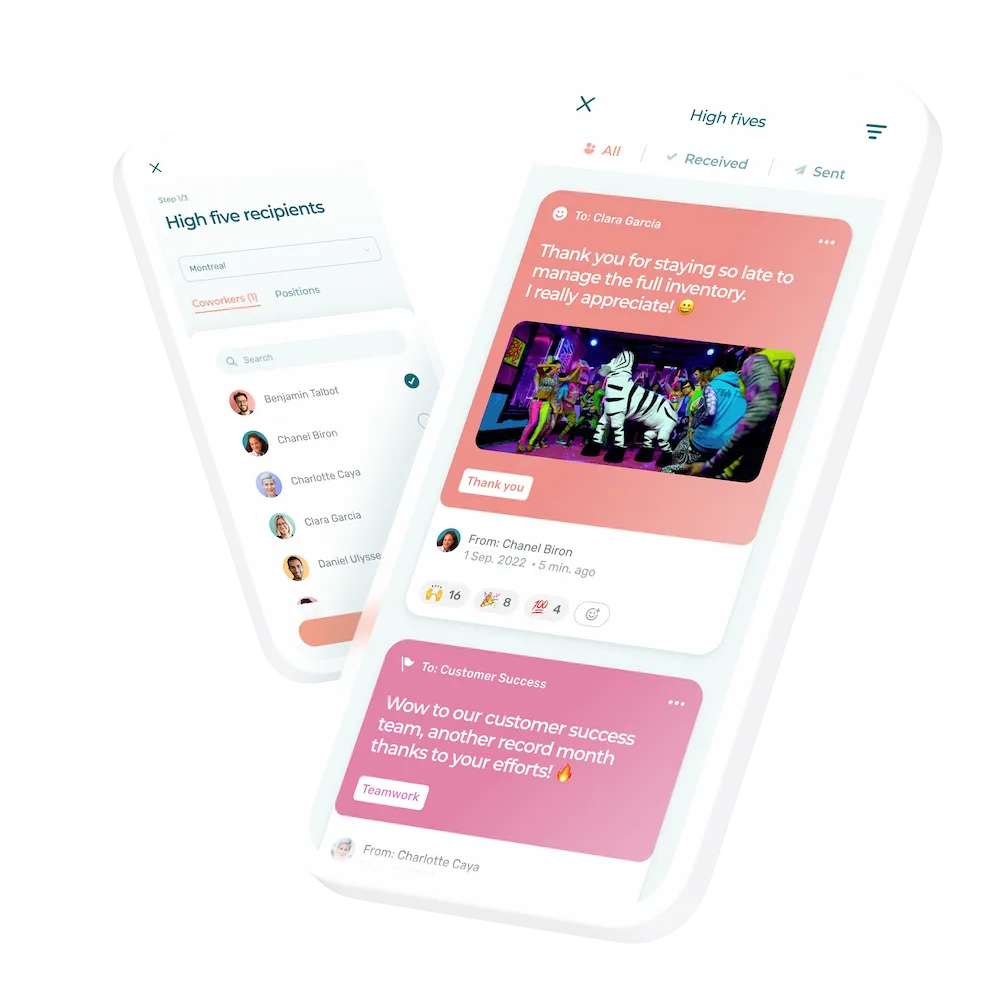These 20 retail job interview questions will help you form a more complete picture of retail job candidates so that you can hire the best people for your retail store.
Identifying the right retail job candidates is more of an art than a science. Resumes only tell you so much.
Retail Job Interview Questions: Key Takeaways
- Smart hiring is a key component of effective retail management.
- Past retail work experience is great, but candidates may have other key skills that will enable them to succeed in a retail job.
- By asking the right retail job interview questions, hiring managers can identify the right candidates for the retail job.
- Asking about skills, values, and career goals can help you determine if the candidate is suited to work in retail.
- Job seekers should also ask questions during retail job interviews to determine if the job or working in retail is right for them.
- Retail managers or those conducting retail job interviews should know the most common retail job interview questions asked by candidates and be able to answer them.
- Attracting great retail staff is only half of the equation. You also have to train and manage retail staff effectively to ensure they meet performance expectations. This will make it much easier to retain retail staff and grow your retail business.
Importance of Asking the Right Retail Job Interview Questions
Managing a retail business efficiently and stress-free is key to long-term profitability. Knowing how to hire the right retail staff is the first step.
Below are the most common job interview questions retail managers ask candidates applying for a retail job. We also include the reasoning for these retail interview questions and what elements you should look for in candidate answers.
Pick and choose from the following retail job interview questions based on the requirements of the retail job you’re filling and the values and needs of your retail business.
Good to keep in mind during every retail job interview:
- Tailor retail job interview questions to the candidate being interviewed.
- You can’t ask the same questions to a high-school student looking to land their first part-time job versus an experienced retail store manager ready to manage and schedule retail staff in multiple stores.
- Answers to retail interview questions will also vary greatly based on the candidate’s career goals and experience working in the retail sector.
20 Retail Job Interview Questions to Ask Candidates
These retail interview questions cover a range of skills and competencies required for success in retail roles. They can help hiring managers assess a candidate’s ability to handle various situations, prioritize tasks, provide excellent customer service, and work effectively in a team environment.
1. How do you handle difficult customers or situations?
Why ask: Retail workers must be able to manage challenging interactions, a crucial skill in retail where customer service is paramount.
Elements in answer to look for: Look for examples demonstrating empathy, problem-solving skills, and the ability to remain calm under pressure. Candidates should highlight their experience resolving conflicts and ensuring customer satisfaction.
2. Can you describe a time when you went above and beyond to provide excellent customer service?
Why ask: Good retail workers are committed to delivering exceptional customer experiences, which is vital for building brand loyalty.
Elements in answer to look for: Candidates should share specific instances where they exceeded customer expectations. Answers should demonstrate initiative, creativity, and a customer-centric mindset. Look for examples of personalized service and proactive problem-solving.
3. How do you prioritize tasks and manage your time effectively in a fast-paced retail environment?
Why ask: Retail staff must be able to juggle multiple responsibilities simultaneously.
Elements in answer to look for: Candidates should outline their strategies for organizing tasks, setting priorities, and meeting deadlines efficiently. Look for evidence of adaptability, multitasking skills, and the ability to stay organized under pressure.
See 9 tips to help your employees stop procrastinating at work
4. Can you describe a time when you had to work as part of a team to achieve a common goal?
Why ask: Retail employees must be able to work with others to ensure smooth operations and customer satisfaction.
Elements in answer to look for: Candidates should provide examples of successful teamwork, highlighting their retail communication skills, willingness to cooperate, and ability to contribute to group objectives. Look for instances where they supported coworkers, resolved conflicts constructively, and achieved positive outcomes as a team.
5. How do you handle inventory management and prevent stock shortages or overages?
Why ask: Retail staff need to manage inventory efficiently to minimize losses and ensure product availability to meet customer demand.
Elements in answer to look for: Candidates should demonstrate knowledge of inventory control techniques, such as regular stock checks, accurate record-keeping, and forecasting demand. Look for examples of their ability to identify and address inventory issues promptly, reducing wastage and maximizing sales opportunities.
6. How do you stay updated on current product knowledge and trends in the retail industry?
Why ask: Retail employees must stay informed about products, industry trends, and competitors to provide accurate information and drive sales.
Elements in answer to look for: Candidates should describe their methods for staying informed, such as attending training sessions, reading industry publications, and following social media channels. Look for enthusiasm for learning, curiosity about new products, and a proactive approach to staying updated on industry developments.
7. Can you give an example of a time when you successfully upsold or cross-sold products to a customer?
Why ask: Upselling and cross-selling are common sales techniques in retail that can increase revenue and enhance customer satisfaction.
Elements in answer to look for: Candidates should share instances where they identified opportunities to recommend additional products or services based on customer needs or preferences. Look for persuasive communication skills, product knowledge, and a focus on enhancing the customer experience rather than just making a sale.
8. How do you handle cash transactions and ensure accuracy in cash handling?
Why ask: Accurate cash handling is essential for preventing losses and maintaining trust with customers and employers.
Elements in answer to look for: Candidates should explain their procedures for counting cash, handling transactions securely, and reconciling discrepancies. Look for attention to detail, honesty, and adherence to company policies and procedures regarding cash handling.
9. Can you describe a time when you had to resolve a customer complaint or issue? How did you handle it?
Why ask: Handling customer complaints effectively is crucial for maintaining customer satisfaction and loyalty.
Elements in answer to look for: Candidates should share examples of how they listened to the customer’s concerns, apologized for any inconvenience, and took appropriate action to resolve the issue promptly. Look for empathy, problem-solving skills, and a commitment to ensuring a positive outcome for the customer.
10. How do you adapt your sales approach to different types of customers?
Why ask: Tailoring the sales approach to individual customer preferences and needs can improve sales success and customer satisfaction.
Elements in answer to look for: Candidates should discuss their ability to assess customer needs, adjust their communication style, and recommend products or services accordingly. Look for flexibility, empathy, and active listening skills in understanding and responding to customer preferences and motivations.
11. Can you describe a time when you had to meet a sales target or goal? How did you achieve it?
Why ask: Meeting sales targets is a common expectation in retail roles. Good retail employees can drive revenue and contribute to business objectives.
Elements in answer to look for: Candidates should provide examples of setting and achieving sales targets through effective customer engagement, product knowledge, and persuasive selling techniques. Look for evidence of goal orientation, resilience in overcoming obstacles, and a track record of exceeding expectations.
12. How do you handle situations where you need to enforce company policies or procedures with customers?
Why ask: Retail workers are expected to enforce company policies to maintain consistency, safety, and compliance with regulations.
Elements in answer to look for: Candidates should describe their approach to enforcing policies diplomatically, explaining the rationale behind the rules while maintaining professionalism and customer service. Look for communication skills, confidence, and the ability to resolve conflicts assertively yet respectfully.
13. Can you give an example of a time when you had to quickly learn about a new product or service?
Why ask: Retail employees often encounter new products or promotions and must be able to quickly learn and adapt to effectively promote and sell.
Elements in answer to look for: Candidates should share instances where they successfully familiarized themselves with new products or services, demonstrating quick comprehension, initiative, and enthusiasm for learning. Look for examples of how they translated this new knowledge into effective sales pitches or recommendations to customers.
14. How do you handle situations where you need to deal with an unhappy or dissatisfied coworker?
Why ask: Staff must be able to maintain positive working relationships for a harmonious and productive work environment in retail.
Elements in answer to look for: Candidates should describe their approach to resolving conflicts or addressing dissatisfaction with colleagues, emphasizing communication, empathy, and conflict resolution skills. Look for examples of constructive feedback, collaboration, and a commitment to fostering a supportive team environment.
15. Can you discuss a time when you had to work under pressure to meet tight deadlines or handle a high volume of customers?
Why ask: Retail environments can be fast-paced and demanding. Employees must be able to perform effectively under pressure.
Elements in answer to look for: Candidates should share experiences where they successfully managed workload demands, maintained composure, and delivered results despite challenging circumstances. Look for evidence of resilience, time management skills, and the ability to stay focused and productive under pressure.
16. How do you handle situations where a customer requests a refund or return?
Why ask: Processing refunds and returns is a common task in retail. Employees must adhere to company policies while providing satisfactory service to customers.
Elements in answer to look for: Candidates should explain their approach to handling refund or return requests efficiently and courteously, following established procedures while prioritizing customer satisfaction. Look for problem-solving skills, patience, and the ability to resolve issues to the customer’s satisfaction while minimizing loss to the business.
17. Can you discuss a time when you had to deal with a difficult coworker or manager? How did you handle it?
Why ask: Conflict resolution skills are crucial in retail settings. Employees must collaborate closely with colleagues and supervisors.
Elements in answer to look for: Candidates should describe how they addressed interpersonal conflicts professionally and constructively, focusing on communication, empathy, and conflict resolution strategies. Look for examples of active listening, seeking common ground, and finding mutually beneficial solutions to resolve conflicts while maintaining positive work relationships.
18. How do you ensure punctuality and consistent attendance for your shifts?
Why ask: Retail staff must demonstrate reliability and timely attendance to ensure consistent customer service and smooth store operations.
Elements in answer to look for: “I proactively plan my commute, allowing extra time for unexpected delays. I also openly communicate with my colleagues and supervisors, promptly notifying them if I anticipate any issues that may affect my schedule. In cases of unforeseen emergencies, I take responsibility for finding suitable coverage or arranging for assistance to minimize disruption to retail operations.”
19. How do you handle scheduling conflicts, such as overlapping shifts or unexpected changes in your availability?
Why ask: There are many types of work shifts in retail, which can sometimes lead to scheduling conflicts. Retail staff must be able to manage their time effectively and communicate professionally with colleagues to ensure workflows aren’t disrupted and that customer service isn’t jeopardized.
Elements in answer to look for: “If there’s an overlapping shift or unexpected change in my availability, I notify my supervisor and colleagues as soon as possible. I either try to swap shifts with a coworker or adjust my schedule to minimize disruption to retail operations.”
20. As a new employee, what would you do if you were unsure of how to complete a particular task or adhere to an internal policy?
Why ask: Retail employees must be willing to seek guidance and ability to adapt and learn in a new environment to maintain a high level of customer service.
Elements in answer to look for: “I would first consult available resources, such as training materials, procedural documents, or employee handbooks. If needed, I would get clarification from a supervisor or more experienced coworker to make sure I’m performing tasks accurately and adhere to company policies.”
See how to create an employee handbook
Employee Corner
33 Retail Job Interview Questions Candidates Can Ask Interviewers
There are many important retail interview questions candidates can ask when applying for a retail job. Hiring managers and anyone conducting retail job interviews should also carefully review this list of candidate interview questions and be prepared to answer them.
Why Job Seekers Should Ask Questions During Retail Job Interviews:
- It shows you’re interested in the position and the retail business.
- It helps you assess your fit within the team—whether you share the same values and work ethics.
- It clarifies role expectations, including work hours and pay.
- It helps you make informed decisions about potential employment.
Below is a long list of retail job interview questions that candidates can choose to ask.
1. Can you describe a typical day or week in this role?
Why ask: To gain insight into the day-to-day responsibilities and activities involved in the position.
2. What are the primary responsibilities and expectations for this position?
Why ask: To understand if job duties align with one’s skills and expectations.
3.What opportunities are there for growth and advancement within the company?
Why ask: To assess potential career progression and long-term prospects within the retail business.
4.Can you tell me about the team I’ll be working with and their roles within the organization?
Why ask: To learn about the team dynamics and how individual roles contribute to collective goals.
5.What qualities or skills are you looking for in an ideal candidate for this retail position?
Why ask: To understand the specific attributes or competencies the employer values in potential hires.
6.What do you enjoy most about working for this company?
Why ask: To get a personal opinion of the employee experience.
7. Can you walk me through the onboarding process for new retail employees?
Why ask: To gauge if the company has a streamlined retail onboarding process, understand the steps involved in integrating new hires into the company, and setting them up for success.
8. How does the company support employee development and training?
Why ask: To gauge the company’s commitment to employees’ professional growth and ongoing skill development.
9. Are there mentorship or buddy programs in place to help new employees acclimate to their roles?
Why ask: To learn about additional support systems that may be available to facilitate the onboarding process for new hires.
10. Can you share some information about the company culture and values?
Why ask: To assess cultural fit and alignment with personal values and work preferences.
11. What challenges or opportunities is the company currently facing in the retail industry?
Why ask: To gain insight into the company’s market positioning and potential future directions.
12. How does the company prioritize customer satisfaction and service?
Why ask: To understand the company’s approach to customer-centricity and its impact on business operations.
13. Can you provide more details about the products or services the company offers?
Why ask: To deepen understanding of the company’s offerings and customer value proposition.
14. What sets this company apart from its competitors?
Why ask: To identify unique selling points and understand the company’s competitive advantage.
15. How does the company approach diversity, equity, and inclusion in the workplace?
Why ask: To assess the organization’s commitment to fostering an inclusive and equitable work environment.
16. Can you describe the management style within the retail team or department?
Why ask: To understand leadership dynamics and team communication.
17. What metrics or KPIs are used to measure success in this role?
Why ask: To clarify performance expectations and how success will be evaluated.
18. How does the company handle feedback and suggestions from employees?
Why ask: To understand the company’s approach to employee engagement and opportunities for improvement.
19. How does the company support work-life balance for employees in retail positions?
Why ask: To assess the company’s policies and initiatives related to employee well-being and work-life balance.
20. Are there opportunities for flexible scheduling or remote work arrangements?
Why ask: To understand the company’s flexibility in accommodating employees’ personal needs and schedules.
21. How does the company handle overtime and ensure employees have adequate time for rest and relaxation?
Why ask: To ensure that employees are not overworked and that there are measures in place to prevent burnout.
22. How does the company encourage employees to disconnect from work during non-working hours?
Why ask: To assess the company’s approach to respecting employees’ time off and boundaries between work and personal life.
23. How does the company foster a positive work environment and culture for retail employees?
Why ask: To assess the organization’s efforts to create a supportive and inclusive workplace culture.
24. Can you share examples of employee feedback mechanisms or channels for voicing concerns?
Why ask: To understand how the company solicits and responds to employee feedback to improve the employee experience.
25. How does the company celebrate achievements and milestones with retail employees?
Why ask: To learn about the company’s approach to recognizing and rewarding employee contributions and accomplishments.
26. Can you describe employee engagement initiatives or activities that promote team bonding and camaraderie?
Why ask: To understand how the company fosters a sense of belonging and connection among retail employees.
27. Can you share examples of how managers provide regular feedback and recognition to their team members?
Why ask: To understand the role of managers in recognizing and appreciating employee efforts on a day-to-day basis.
See Retail Employee Management: What it is and How to Effectively Motivate Worker
28. Are there policies or guidelines in place to prevent scheduling conflicts and ensure adequate coverage during peak times?
Why ask: To ensure that scheduling practices prioritize employee well-being and operational needs.
29. How does the company handle requests for schedule changes or accommodations?
Why ask: To assess the company’s flexibility in accommodating employees’ scheduling preferences and personal commitments.
30. What measures are in place to prevent issues such as over-scheduling or under-scheduling of employees?
Why ask: To ensure fair shift scheduling practices that are considerate of employees’ availability and workload.
31. How does the company handle employee time off requests, and what is the process for requesting time off?
Why ask: To understand the procedures and expectations for requesting and granting time off.
See How to Make Time Off Requests: 11 Smart Tips + Free Time Off Request Form
32. Are there any blackout periods or restrictions on taking time off during certain times of the year?
Why ask: To be aware of any potential limitations or constraints on scheduling vacations or personal time.
33. How far in advance are employees required to request time off, and how flexible is the company in accommodating last-minute requests?
Why ask: To understand the lead time required for time off requests and the company’s flexibility in responding to urgent needs.














